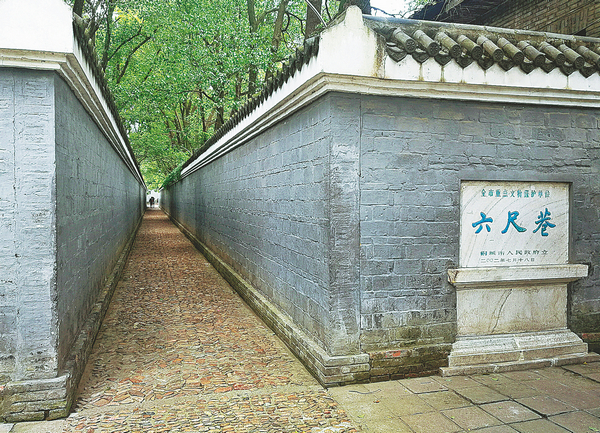Ancient story of narrow alley helps broaden minds


HEFEI-Liuchixiang, a 2-meter-wide alley in East China's Anhui province, regularly attracts floods of visitors. It has an ancient story behind it, one which vividly explains the essence of tolerance and compromise that is widely valued in China.
During the reign of Emperor Kangxi during the Qing Dynasty (1644-1911), one of his ministers, Zhang Ying, received a letter from his family back in his hometown of Tongcheng in Anhui.
From the letter, Zhang learned that his family had quarreled with their neighbor Wu over the property boundary between their respective houses. Since both families enjoyed high status in Tongcheng, the local court struggled to reach a satisfactory verdict.
Zhang's family wrote the letter hoping that Zhang, a high-ranking official in the imperial palace, could force the Wu family to yield to their demands.
However, Zhang replied with a poem: "Writing a letter from home, miles away, just for a wall. All that fuss over one meter or two. Looking at the ten thousand mile-long Great Wall. Long gone is its builder Emperor Qinshihuang."
Enlightened by his reply, the family members realized that the wall was merely a temporary structure, and it was the close relationship with their neighbors that really mattered.
They decided to move their wall back by about a meter to appease their neighbor. In return, the Wu family, deeply moved by the generous act, retreated a further meter backward in building their wall. It created a narrow "alley" between the houses that is approximately 2 meters wide.
More than 300 years later, in modern China, Tongcheng has become a national historical and cultural city, according to a statement released by the State Council on Nov 12.
Among all the valuable historical sites in the city, the narrow alley is one of the most renowned attractions. It serves as a lesson, inspiring people to observe public spirit and cherish harmony, especially in disputes and conflicts.
Many locals still live in tiny houses next to each other and share walls with their neighbors. Inevitable problems like noise and division of responsibility when it comes to a broken wall are commonplace.
Zhang Yun, Party secretary of Liuchixiang community, also a descendant of Zhang Ying, has drawn on his ancestor's wisdom in mediating such disputes.
"A good neighbor is better than a brother far away. I always cite the ancient story of my ancestor to persuade them to make compromises for each other," he says.
In charge of a community with about 7,000 residents, Zhang Yun handles at least two disputes per month.
"It can be a waste of both time and energy if a minor case goes to court. Many disputes can be nipped in the bud if one party takes a step back first," says Zhang Yuan.
"I know it is hard to make a concession, especially when you feel that you are right, but if the seemingly aggrieved can step back a little, the other side might return the favor one day in other ways," he adds.
Forbearance and harmony, long openly honored in the country, are evident in bilateral relations between countries as well.
The narrow alley story has been frequently quoted by Chinese leaders when solving international disputes, says Ye Xin, curator of the city's museum.
"We are repairing the old houses on both sides of the alley; not only for better preservation of the physical relics, but also for the traditional Chinese culture the alley represents," Ye says.
Xinhua






































